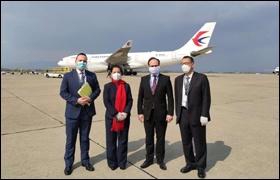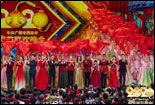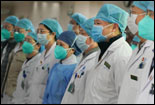On global trade, he warned that a reversal of trade openness would hurt the poor in both developing and developed countries. He suggested that the uncertainty in world economy would hinder investment and global growth.
"The escalation of tariffs will negatively affect the entire global growth outlook and slow down the pace of poverty reduction at a time when we can least afford it," said Jim Yong Kim.
cro181106a.mp4 |
The following is the full text of his speech:
President Xi, heads of state and government, your royal highness and honored guests.
It's a great honor for me to be here, the China International Import Expo. And I was here earlier in the week to celebrate with Chinese authorities the 40 anniversary of China's opening up. And we talked about the great achievements of China in that period. The per capita income increase 25 fold, more than 800 million people lifted themselves out of poverty. That's 70% of all the people in the world who were lifted out of poverty in that period.
And I was also here to celebrate the evidence of China's continued commitment to reform, and I want to congratulate President Xi and the entire Chinese government, especially the mayors of Shanghai and Beijing, China went up 32 places this year on our Doing Business Index.
You know, we know that the proper impact of trade liberalization in developing countries is clear. But in recent years, trade liberalization has stalled. And in just the last few years, we've seen the acceleration of the return to protectionism.
The escalation of tariffs will negatively affect the entire global growth outlook and slow down the pace of poverty reduction at a time when we can least afford it. A reversal of trade openness would hurt many poor households in both developing and developed countries. And protectionists trade policies can cause a chain reaction, as more countries adopt similar measures. The global recovery is built on investment, and there's a real danger that businesses will decide to wait for more clarity before engaging in new projects. Recent World Bank analysis shows that in a scenario where investor confidence is shaken and investments drop, every country will feel the negative effects.
We need to continue to support trade reforms that can deliver greater shared prosperity. That includes removing trade barriers in areas such as services, agriculture, and e-commerce, and reducing subsidies and other measures that distort trade. The overall aim is to strengthen, as so many have said, the multilateral trading system.
China has done this in the past, and the country is committed to continuing its policy of opening up in the future. And this has not been without domestic pain. China's entry into the WTO in 2001 cost significant hardship among workers of state enterprises that were no longer competitive and farmers that face lower world market prices.
But China persisted with opening up and help those affected with better safety nets, active labor market policies, and lower agricultural taxes and fees. By ensuring that all layers of society gained from opening up, China ensured continued support for the reform programme.
This is lesson for everyone. Within countries, policy packages should ensure that trade gains are shared widely. Trade contributes to creating jobs overall, but many people and entire regions can be left behind. With trade, we don't have to choose between inclusiveness and economic growth.
When we're working to boost and invigorate trade, those workers in those communities that aren't benefiting from globalization need to be at the front of our minds.
Part of this is because the debate about embracing market forces is over.
In his speech of Davos in 2017, President Xi talked about another kind of ocean other than the one he describe today, the ocean that is China. And he said, and I quote this all the time: whether you like it or not, the global economy is the big ocean that you cannot escape from. Any attempt to cut off the flow of capital, technology, products, industries and people between economies, and channel the waters in the ocean back into isolated lakes and creeks is simply not possible.
For us, the challenge is to put every country in a position where it can swim in this ocean, where its people have the human capital to compete, and countries have the institutions that make their economies resilient, competitive, and caring.
For the international community here today. I just want to recount briefly a trip that I made just over the last two days. I visited Guizhou, and I was specifically taken to Guizhou by the Ministry of Finance, because it's one of the poorest provinces in China. Just five years ago, the poverty rate was thirty percent.
This year. The poverty rate is eight percent, and it went from thirty to eight percent through e commerce. It is a Taobao village. And the development of e-commerce meant that the farmers in Guizhou could now sell kiwi, spicy chicken and their products all over the world. So increasing access to global markets, increasing access to capital led to a drop in poverty from thirty percent to eight percent.
I was so impressed by that model. I thought we have to try this. And I spoke with President Kenyatta just yesterday. There are models here of moving from poverty to a new kind of economic activity through trade that will lift people out of poverty.
You know, I hope that the discussions at this milestone China International Import Expo will bring new ideas and avenues, just like the ones we saw in Guizhou to make the global market system work for everyone and the planet, help end extreme poverty and ensure equality of opportunity for everyone in the world.
Thank you very much.




















